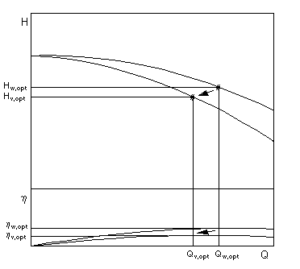Centrifugal Pump
A centrifugal pump is a hydraulic flow machine in which the transport of the pumped medium is realized by utilizing the centrifugal forces (centrifugal forces) caused by the rotation of the impeller. Energy is transferred by deflecting the flow within the impeller blades.
Centrifugal pumps are typically applied for pulse free, continuous or intermittent operation, but they are not suitable for dosing or metering applications. The strengths of this process are in the continuous, pulsation-free operation. Another advantage is the relatively simple design and good adaptability, which avoids high maintenance costs.
The application is limited with regard to the viscosity of the pumped medium. With increasing fluid viscosity the efficiency is decreasing. Therefore the application is practically limited to fluids with a kinematic viscosity up to 100 .. 150 mm²/s. For higher viscosities positive displacement pumps are preferred.
Important parameters are head, flow rate, power requirement, efficiency and NPSH value. The parameters are generally shown as performance curves depending on the volume flow (flow rate).



